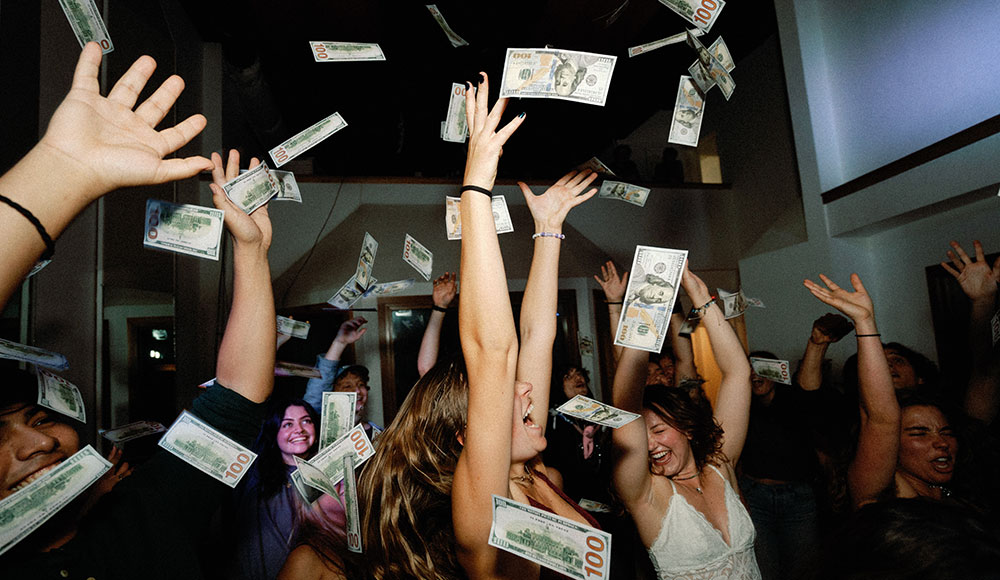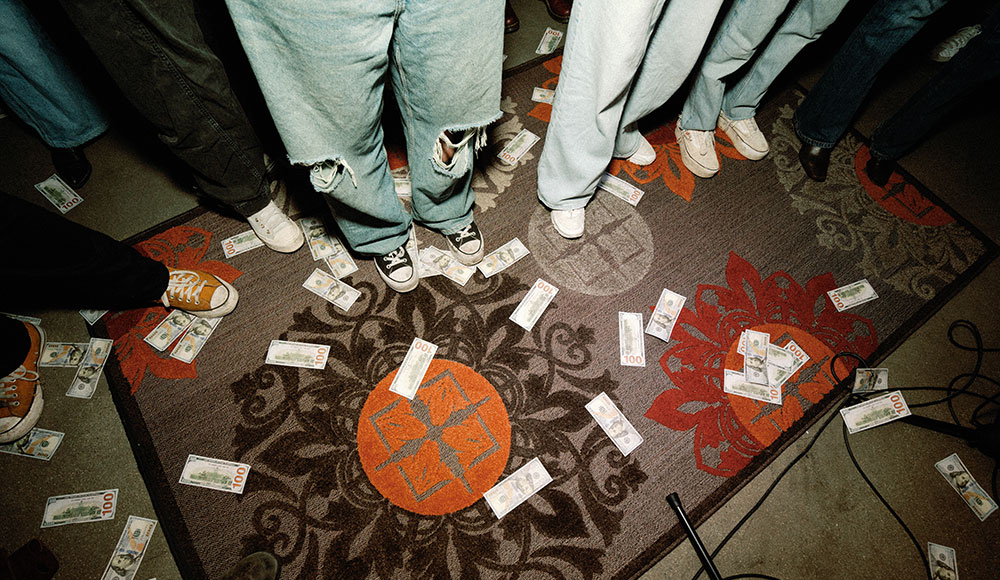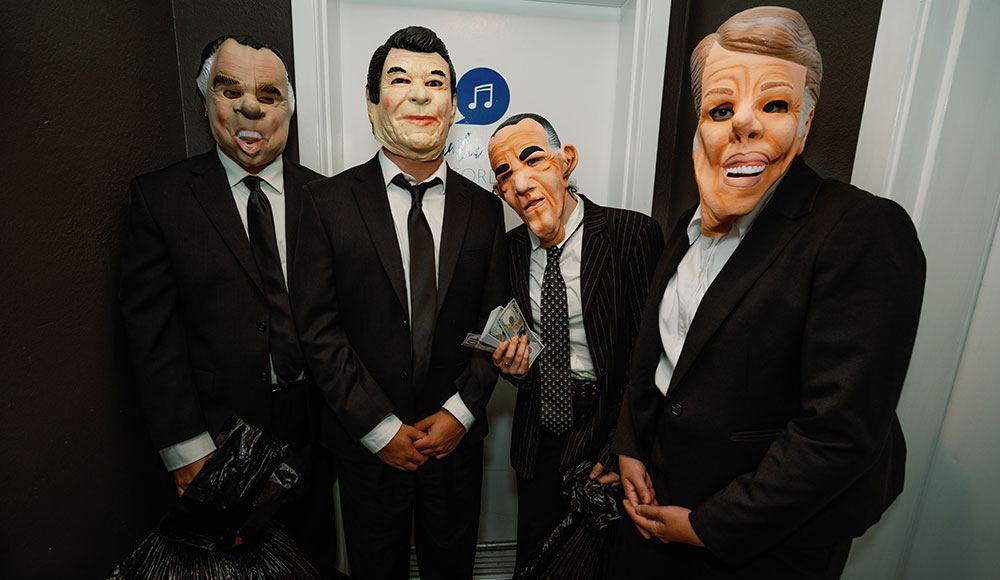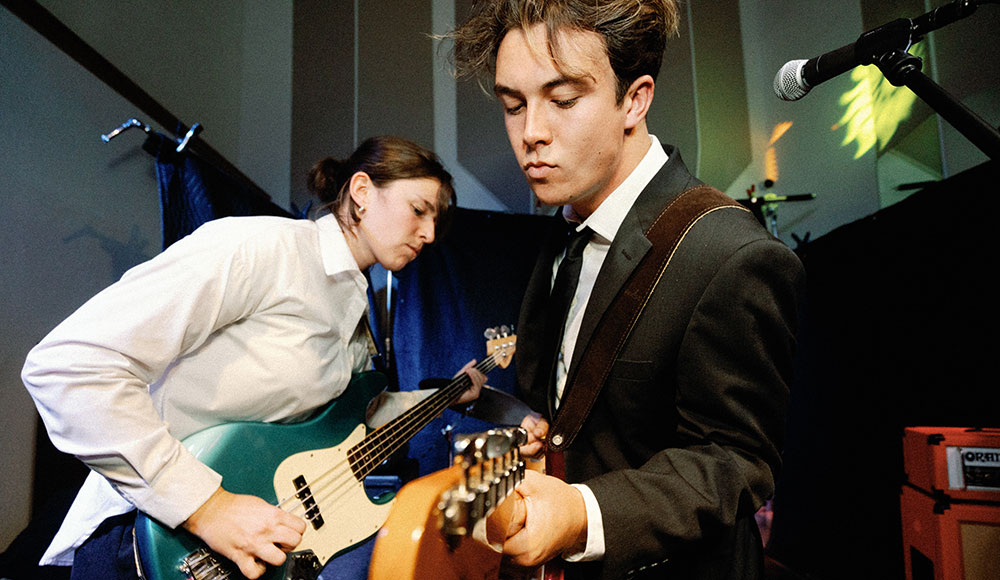It’s January 4, the night of Trestles’ Postcard EP announcement show at Felton Music Hall. Lead singer and guitarist Hunter Kelly shades his eyes from the stage lights between songs, focusing on the mosh pit returning to stasis, entropic bodies in motion coming to rest.
Someone isn’t getting to their feet fast enough for his taste.
“If someone falls, what do you do?” he asks the crowd.
The crowd knows this one by heart.
“PICK! THEM! UP!” they answer.
Trestles formed in the crucible of Covid and bloomed when lockdown lifted, an era when everyone was knocked off their feet, and some were more keen than others to pick each other up.
“A lot of people who’ve met us told me it’s hard to hang out because of how bonded we are,” Kelly said during an interview at Pleasure Point, a natural fit for this quartet’s lyrical content pulled from his lifeguarding days, and its sound of bright and sprightly surf punk.
One song currently soaring on the digital airwaves from their new EP is “The Beach Betrayed Me.” Their 2022 LP, Halfway Up the Hill, name-checked surf spots in titles such as “Getchell’s” and “Second Peak,” the latter not far from our picnic bench. The liner notes tell me he’s “gonna park the 4Runner on 38th.”
But even if they find parking, skyrocketing rent, few places to practice or perform at louder volumes, and fewer places willing to pay bands that play their own music, rather than covers, have worked against even the best artists. A town that once boasted shirts asking to “Keep Santa Cruz Weird” could now conceivably say “Keep Santa Cruz Musical.”
Even with resource scarcity, Trestles operates cooperatively, feeling there’s enough room for everyone on the wave. By keeping open channels with musicians in other California cities; merging bloodlines by cohabitating and sharing members with other local bands; lucking into some generous benefactors; and with a dose of savvy and verve, Trestles perseveres.
“We credit everything we have to Urbani Cellar being open when it was,” said Kelly.

Formerly Bocci’s Cellar, this inveterate but not invulnerable Harvey West area business (RIP) didn’t just remove the title in a grand rebranding—they removed the actual bocce ball courts, paving them over in favor of a dance floor. Kelly said the nearby bus stop was crucial for easy UCSC student access.
“On any given night there were probably three to four college bands playing.”
It fed the late appetites of students poorly addressed by our sleepy town, other than in bars they might be barred from entering, which applied to Trestles at the time. Kelly, lead guitarist Jackson Jones and bassist Sophia Wall are 21, while drummer Malena Clark is 23. Bocci’s was one of the latest operating venues, which often have shut-offs reflecting their suburban proximity. “You could play till 2am,” Kelly said.
Jones called the former management there “very pro-artist.”
“You didn’t need to be anyone,” Kelly said. “If you’d never played a show in your life, you could be booked for next Wednesday if you wanted it.”
That attainability was essential to buttressing a music scene shattered during the lockdown, turning bands perhaps destined to be “house party background noise” into names. It was instructive how mutual support, not gatekeeping in the guise of quality control, is an ethos that makes a scene thrive. How can you pay it forward if you were taught by venues and the bands playing them to live by “What’s in it for me?”
That’s something that Trestles hasn’t forgotten.
“We got in [to The Catalyst] through an out-of-town band who needed local support,” Jones said. “They were like ‘they sold this amount of tickets at Urbani so they can probably sell some [here].’ Local bands like us would start headlining and we’d get more local bands on the bill.”
They’ve now played The Catalyst 15 times, two of those on the main stage. Do the math on how many bands they boosted in that time, and how many of those bands boosted others.
“We’re getting to where bigger touring indie artists play the main stage, we’ll get offered those spots,” Wall said.
And what did Bocci’s get for incubating Santa Cruz bands?
“It got priced out,” Jones said. The property is currently on sale by owners Larry and Gloria Behman for $1,099,000, for any job creators looking to resurrect a community space.
Sluttony came up at the same time, what bassist Caroline Margolis fondly calls “the boom right after Covid.”
“It was very ‘iron sharpens iron,’ learning from each other and playing together a lot. [Bocci’s] gave the scene a place to go.”
Maybe Bocci’s generosity was unsustainable, maybe profit margins in the live entertainment industry are suspect. Avery Murphy, singer-guitarist of Hearsing, support band at the Felton show Kelly and Jones moonlight in, cannot believe what his band made at Boccci’s.
“Soooo much money,” he says, incredulously. “Pretty much all of the door”—gross ticket sales from the box office. For perspective, Kelly disclosed figures elsewhere: “When it’s our booking, it’s 45 percent off the door plus it’s our responsibility to pay our support.”
Bocci’s passing left a venue void difficult to fill, not that some aren’t trying. Trestles hears many younger bands book SubRosa Community Space, but that’s the difference between 250 and 25 person capacity. Hard to pack the latter and claim that to a talent booker as evidence of your crowd draw.
Kelly calls the college scene now a “crater” unto itself. Or more like an underwater volcano.
“I don’t think most of above-water Santa Cruz would be aware,” he said. “Everyone who wanders into these shows is surprised at the caliber of artistry.”
That momentary un-siloing of the music scene after lockdown was good for post-college bands like Hearsing.
“Most of the bands our age, mid-to-late twenties, are coming through [town], which is great,” Murphy says. “But then they’re through.”
He laments the tidal nature of Santa Cruz, the spectacular ebb every June when colleges empty.
“Because so many that come to shows are students, and the students in bands tend to leave, if you’re a band that develops a fan base who are all students, you might come back if you’re away [on tour] for six months and those kids that graduated are gone.”
But for that shining period of 2021-late ’22, everyone was present. “It was about the music,” Margolis says. “Letting young bands take the stage and gain experience actually playing shows. Taking it outside of the garage, you know?”
Garage Band
I first stumbled onto Trestles one May afternoon in 2023, playing in my garage.
My housemate Trevor Johnson would host touring bands in our San Diego home. They’d sleep on our renowned XXL couches and be gone when I woke, or hang around longer and record several tracks in the garage in front of a curtain the color of a mini-golf AstroTurf. Johnson would chroma key images over that, live-intercutting with different band angles using multiple cameramen, then release the finished videos online.
This was what Trestles were doing when I investigated the beautiful racket coming through the walls. Staying spry to avoid the two circling camerapersons, I was immediately impressed by the dexterous guitar playing. It’s no accident that Jackson Jones has repeating initials like Dick Dale. He chooses incredibly tasty earworm riffs that resonate, then burrow.
The images Johnson chose for Trestles’ song “Steering Wheel”?
Grainy surf videos, of course. Their namesake may be the train trestles that bridge Seabright with the Boardwalk, world famous for the fog jumping scene in the vampire film The Lost Boys, but down south, Trestles titles a strip of surf spots from San Onofre State Park to San Clemente.
A few riffs lingered after the band didn’t. Some of that was saturation—they recorded several takes, so I heard each song five or six times—but most was their innate catchiness.
Trestles had played with Johnson’s band Fieldrush at a house show the night before, an option in peril back home.
“I think house shows are more impossible in Santa Cruz than they’ve ever been,” Kelly said, “especially due to the noise ordinance in the past five years.”
What has changed specifically?
“A clause that says it’s up to an officer’s discretion if you’re being too loud. They’re not going to measure how loud you are, not going to say you’re out by a certain time. If they so please, it can be over.”
Kelly meant Chapter 9.36 of the Santa Cruz Municipal Code, specifically the Enforcement clause. Another doozy: the Subsequent Offense clause, which states that anyone “within forty-eight hours after receiving such a citation again violates the same section, is guilty of a misdemeanor.” That’s not just house shows—that could be any band practice that goes late.
Talk about a chilling effect on local music. Even sneakier, Kelly brought up how tickets can haunt house venues for rental generations, so what one noise violator thinks is the first fine is actually the house’s second or third on an old lease, incurring steeper prices.
Clark worries house show circuit hazards will leave new bands without a runway the same way Bocci’s closing did.
“How are you supposed to get traction?” she asked. Not to mention being an indie promoter, flyering for weeks only to send everyone home on a dime. “We were asked to play one and it was completely shut down before music really started. You don’t want that to be how it is.”
Thankfully, Trestles has a safe practice space at Clark’s. Mother Shivaun and father Ross, who recently passed, were ardent fans since their inception, calling themselves “patrons of the arts” by letting their daughter’s band tinker with tunes in the basement—even when she isn’t around.
“Every time we’d come up out of the basement we’d apologize to them,” Kelly said. The apology wasn’t unwarranted.
“It comes through the pipes,” Clark, who lives in Long Beach, said. “You can hear it through the shower drain.”
But once upstairs, they’d find their patrons “humming the songs, smiling.” Both self-produced Postcard, out Feb. 28, mixed and mastered by Henry Chadwick, and the forthcoming LP produced by Jim Wirt at Santa Cruz Recording Studios, will be dedicated to Mr. Clark.
Wirt, Grammy-nominated producer of Fiona Apple, Incubus, and many others, and wife Claire are busy finishing a compilation of Santa Cruz bands. Trestles’ track “Headfirst” opens it.
“Out of the kindness of their own hearts,” Kelly said, “they’re trying to raise the scene up.”
I asked them if it needed elevating.
“Not that it needs elevating,” Kelly said.
“It’s worth elevating,” Wall corrected.
Dead Presidents
Last October, Trestles shot a climactic scene for their unreleased music video at Santa Cruz Recording Studios for their song “Point Break (1991).”
The film it references has an FBI agent infiltrate a team of bank-robbing surfers called the “Ex-Presidents” for the masks they wear during heists. The music video copies this conceit, Trestles donning the same masks and doing the same crimes, but in this universe, they’re noble outlaws, leaving their score behind at a house party.
“Redistribute the wealth,” Kelly said, wearing the face of who arguably seeded the California homelessness crisis when he shuttered state hospitals. Jones wore Nixon’s face; Wall, Carter’s; Clark, LBJ’s.
“‘Check out Trestles,’” the Wirts’ daughter, Sarah, told them. Wall said Sarah went further, turning her parents’ heads to what was happening in the scene at large. “‘You guys have the means to invest in this.’”
Claire informs me that Sluttony, who follows Trestles on the compilation with their song “Bill,” was the test case. She invited them to “come and record a single. It completely belongs to you. Then if you want to make a record with us, we’ll give you a good deal on recording.”
That process worked so well, “We did that with twelve bands,” Jim says.

in a gnarly economic shorebreak. PHOTO: Natasha Lozanoff/NatashaLozanoff.com
The idea is to distribute, rather than sell it. Give it to people who want to know more about what’s happening here, like a cultural artifact. Wirt and his apprentice, Josh Dimatulac, hope to “take it down to LA and have some meetings. Try to get some press down south, maybe get some A&R people up here to sign some of these bands.”
Wirt sees a potential feeding frenzy the likes of the Seattle grunge launch; Athens, Georgia, for alternative; Victory Records in the early 2000s for hardcore and emo.
They may need to hurry, however, before their artifact becomes a relic. Talent can only survive so long in inhospitable conditions. One of the bands featured, Ladders, has already broken up. Mom Cars went on hiatus. Sluttony, the keystone, decamped for Los Angeles.
“I lived in Santa Cruz a year after graduation and it financially took everything out of me,” Margolis says. “For us it was just a case of needing to move home to get on our feet again. It’s nice to kind of have one foot in each place.”
Melody Caudill, keyboardist in Hearsing, playing on the comp under solo moniker Career Woman, doubts she can stick around after college. She lives with Jones, Wall and an upstairs neighbor in a $4,200 3B “old Victorian.”
“I’m going to try my best to stay. My job right now definitely won’t be enough.”
The Wirts heard bands’ concerns about venue shortage and hope Santa Cruz Recording Studios can serve that need, starting with listening parties.
“When projects get finished [by Jim],” Claire says, “let the band come in and play. Invite whoever they want to. If they want to make it public, they can.”
The high-ceilinged center studio space earmarked for this, sprawling between the closed-off A and B rooms, was packed on shoot night with close friends of the band, five of whom mock-played Trestles’ instruments, lip-syncing and pick-syncing to the backing track. Then Trestles tore off their masks, shoved the pretenders aside, hijacked the instruments and rocked out, each action requiring multiple takes.
One fan volunteered to find the bag of cash on camera. Only one take was possible. No one was expected to play 52+ pick up all over the room. There was a countdown, and the cash was hurled into the air.
It fluttered like a kaleidoscopic snowfall twinkling, trickle-down theory made real, the audience’s hands outstretched to snatch it if they could just reach high enough.

Living in a Postcard
Between songs at the Felton show, an audience member continues to float on a sea of hands. The same way six pallbearers can lift a coffin, a crowd can carry a fan’s dead weight like they’re weightless.
“You’re crowd surfing to nothing,” Kelly says. “That means you’re a good crowd.”
And it is. Every other song they dutifully sing along, knowing every word. They clap in rhythmic unison to a new one.
I ask one fan how they could afford concert tickets in this inflationary moment. Embarrassed, she says, “I have really good friends that let me into concerts if I’m being honest.” Her friends laugh. “But a lot of people don’t have that ability or connection.”
The crowd is a coalition of ages. A quintet of high school girls protectively link arms and weave through everyone as a chain, past grizzled Felton locals dancing, past a college freshman piggybacking on a friend’s shoulders like a four-armed giant amok in the mosh pit.
This could be one secret to Trestles’ Santa Cruz dominion: their music appeals to everyone.
“Trestles has a huge following that is different than what [Sluttony] had,” Margolis says. “They’ve been really smart about playing certain community events or with certain old local bands.”
To this point, they’re participating in the next Wharf Wednesday Feb. 19, an outdoor concert series promoting its small businesses after the collapse. Last December they opened for the Expendables, an older band whose audience skews older than its members because of their Sublime and dub influences.
“Knowing who your audience is and knowing how to play shows to diversify it, get in front of people who hadn’t seen you before.”
It’s almost like I hadn’t seen Trestles before.
My garage was a poor vessel for Trestles’ power. Playing to four people pales next to a sold-out crowd. Clark is a joyful thrasher, Wall a thunder tamer, and Kelly an expert crowd conductor. We are the orchestra, and we play what he directs us to. Claire Wirt calls him “The Mayor of Santa Cruz.”
If only this mayor could save bands here from death and exile.
“Priced out,” Wall said, calling the assassin by name. “It’s so expensive. You know it’s gorgeous but if you don’t have a reason to live here, like, why?”
“We’re paying for beauty,” agrees Trestles’ merch girl, Charlotte Magee. “It’s not like it’s a major city. It’s not like there’s a lot of employment opportunities.”
She transferred here to complete as a UCSC undergrad, and has two full-time jobs: mental health counselor and barista. She’s demoralized by the nepotistic lottery of apartment searching, blaming her alma mater for letting more students in each year.
“You almost have to know people to get affordable housing. It shouldn’t be so hard.”
Jones is not happy where he’s living, but still has to fight to afford it, working as a server at Dharma’s in Capitola. Wall and Kelly intern at Universal Audio in Scotts Valley, and Clark works remotely as an educational specialist for Steps to Success.
“We’re trying to expand, and working in the studio, and going to school still,” Jones said. “It’s like three full-time jobs at once just to afford to share a bedroom in this town.”
The price of that bedroom? $1000. In Kansas City, MO, you can rent a whole 3B house for $1000.
“It’s not economical for me to try and live somewhere with how much time I want to give this band,” Kelly said. He will live with his parents as long as “they’re willing to keep me there,” benefitting both from their largesse and how the pandemic softened the American stigma of multigenerational living, when folks got under one roof to look out for one another.
Near the end of their set, Wall implores the crowd as Kelly did.
“Let’s not kick each other. Let’s be courteous.”
They play their “last” song and exit stage right.
“ONE! MORE! SONG!” the crowd chants to draw Trestles back for an encore. It’s a performative tease almost every band now engages in. They’re gone only minutes before surfacing. Kelly steps to the mic.
“Are you suuuure?” he asks facetiously.
Someone in the crowd leads the rest in a crescendoing chant both hopelessly unrealistic and a sweet testament to how beloved this band is.
“TEN! MORE! SONGS! TWENTY! MORE! SONGS! FIFTY! MORE! SONGS!”













